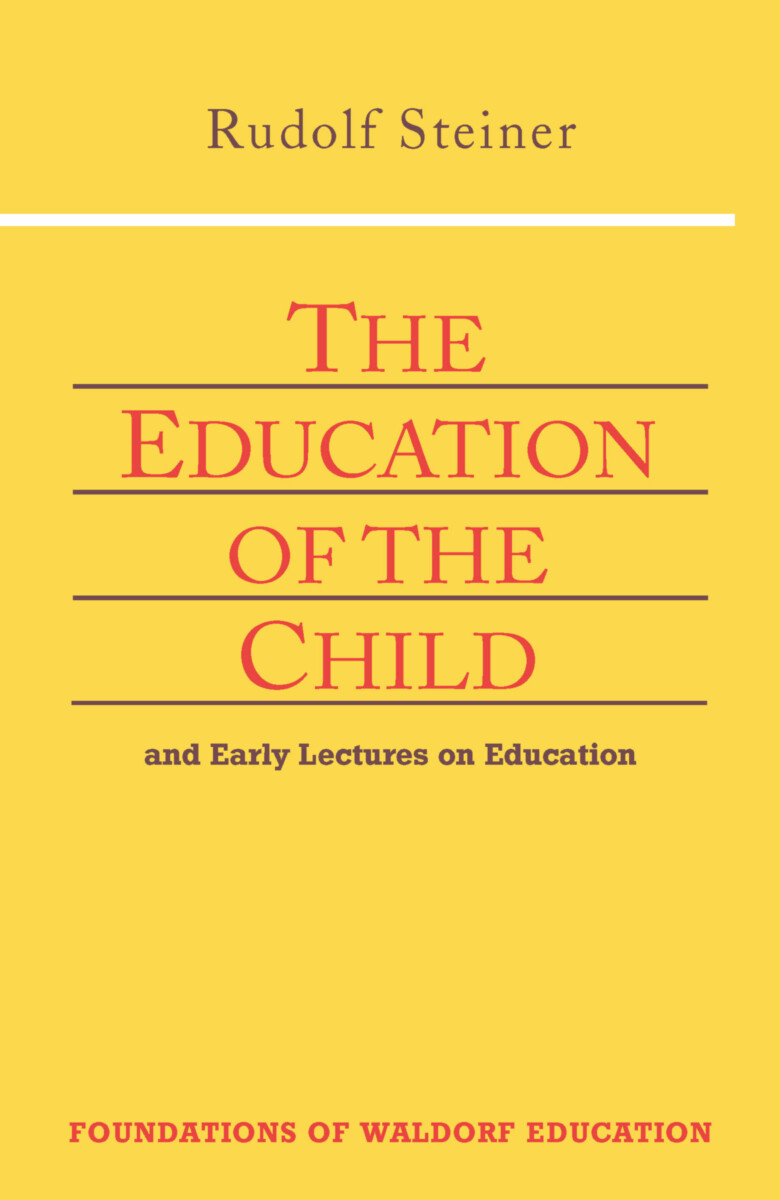The Education of the Child
And Early Lectures on Education (CW 293 & 66)
Introduction by Christopher Bamford
Translated by Mary Adams, Robert F. Lathe, Nancy Parsons Whittaker and Rita Stebbing
- Publisher
SteinerBooks - Published
1st May 1996 - ISBN 9780880104142
- Language English
- Pages 160 pp.
As early as 1884, while tutoring a boy with special needs, Steiner began a lifelong interest in applying spiritual knowledge to the practical aspects of life. Steiner originally published the essay at the core of this book in 1907. It represents his earliest ideas on education, in which he lays out the soul spiritual processes of human development, describing the need to understand how the being of a child develops through successive “births,” beginning with the physical body’s entry into earthly life, and culminating in the emergence of the “I”-being with adulthood.
Also included are several early lectures on education, ranging from 1906 to 1911, well before the birth of the Waldorf movement in 1919.
ORIGINAL SOURCES: The essay “The Education of the Child in the Light of Spiritual Science,” translated by George and Mary Adams, appeared originally in German in the journal Lucifer–Gnosis (nr. 33), 1907, under the title “Die Erzieuhung des Kindes vom Geschictspunkte der Geisteswissenschaft.” It is included in vol. 34 of the Collected Works of Rudolf Steiner, published by Rudolf Steiner Verlag, Dornach, Switzerland, 1987. The lecture “Teaching from a Foundation of Spiritual Insight,” translated by Robert Lathe and Nancy Whittaker, is included in Ursprungsimpulse der Geisteswissenschaft, vol. 96, as “Erziehungspraxis auf der Grundlage spiritueller Erkenntnis”; the lecture “Education in the Light of Spiritual Science,” translated by Rita Stebbing, appeared as “Die Erziehung des Kindes vom Standpunkt der Geisteswissenschaft”; and the lecture “Education and Spiritual Science,” translated by Rita Stebbing, appeared as “Schulfragen vom Standpunkt der Geisteswissen-schaft” in Die Erkenntnis des Ubersinnlichen in unserer Zeit, vol. 55; the lecture “Interests, Talent, and Education,” translated by Robert Lathe and Nancy Whittaker, is included in Antworten der eisteswissenschaft auf die grossen Fragen des Daseins, vol. 60, as “Anlage, Begabung und Erziehung des Menschen,” all of which are in the Collected Works of Rudolf Steiner, published by Rudolf Steiner Verlag, Dornach, Switzerland, 1987. The lecture “Interests, Talents, and Educating Children,” translated by Robert Lathe and Nancy Whittaker, appeared originally in the magazine Die Menschenschule, vol. 31 (nr. 6),1957 and vol. 48 (nr.1), 1974.
C O N T E N T S:
Introduction by Christopher Bamford
PART ONE:
The Education of the Child in the Light of Spiritual Science
PART TWO:
Teaching from a Foundation of Spiritual Insight (Berlin, May 14, 1906)
Education in the Light of Spiritual Science (Cologne, Dec. 1, 1906)
Education and Spiritual Science (Berlin, Jan. 24, 1907)
Interests, Talents, and Educating Children (Nuremberg, Nov. 14, 1910)
Interests, Talent, and Education (Berlin, Jan. 12, 1911)
Rudolf Steiner
Rudolf Steiner (b. Rudolf Joseph Lorenz Steiner, 1861–1925) was born in the small village of Kraljevec, Austro-Hungarian Empire (now in Croatia), where he grew up. As a young man, he lived in Weimar and Berlin, where he became a well-published scientific, literary, and philosophical scholar, known especially for his work with Goethe’s scientific writings. At the beginning of the twentieth century, he began to develop his early philosophical principles into an approach to systematic research into psychological and spiritual phenomena. Formally beginning his spiritual teaching career under the auspices of the Theosophical Society, Steiner came to use the term Anthroposophy (and spiritual science) for his philosophy, spiritual research, and findings. The influence of Steiner’s multifaceted genius has led to innovative and holistic approaches in medicine, various therapies, philosophy, religious renewal, Waldorf education, education for special needs, threefold economics, biodynamic agriculture, Goethean science, architecture, and the arts of drama, speech, and eurythmy. In 1924, Rudolf Steiner founded the General Anthroposophical Society, which today has branches throughout the world. He died in Dornach, Switzerland.


